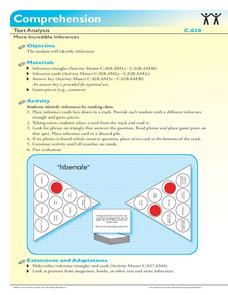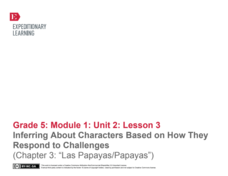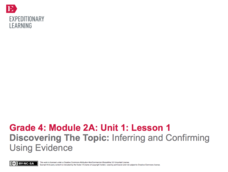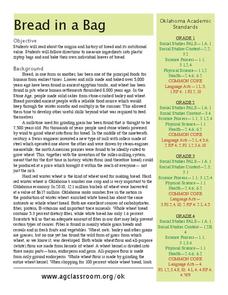K20 LEARN
Between The Lines: Inferences In The Narrative Life Of Frederick Douglass Excerpt
Good literature can be much like an iceberg requiring readers to presume that the bulk of the meaning may be inferred to be found below the surface. Here's a instructional activity that asks scholars to conduct a close reading of...
Southern Nevada Regional Professional Development Program
Close Reading in the Classroom
Close reading is key to the analysis and interpretation of literature. A close reading of the title and the epigraph of “The Love Song of J. Alfred Prufrock” offers readers an opportunity to examine how even single words or names can...
Curriculum Corner
Inferencing
Inferencing is a necessary reading skill to uncover non-explicit messages in text. Use the set of resources as a way to guide learners toward becoming expert inferrers through reading prompts and literature with text and without text.
Curated OER
Frindle: A Guiding Reading Unit
Guide your class through a reading of the popular children's book, Frindle, with this comprehensive literature unit. Starting with a brief introduction to the guided reading process, the class goes on to read the story two chapters...
K20 LEARN
OPTIC - A Reading Strategy Recipe: Visual Literacy
A visual literary lesson provides learners with OPTIC (Observations, Predictions, Themes, Inferences, Conclusions), a reading strategy to help them understand and interpret visual and written texts. Scholars practice the strategy with a...
Ministry of Education - Ontario
Reading Between the Lines
Learning to read between the lines, to recognize the on-the-surface meaning as well as the implied or inferred meaning of text, is an important skill for all readers. The materials and activities in this 73-page packet are designed to...
Curated OER
Mini-Lesson Planning for Inferences
Making inferences and drawing conclusions is a key component to successful active reading. Encourage your class to use context clues and prior knowledge to infer different elements of a story, including the setting, plot, and character...
Florida Center for Reading Research
Comprehension: Text Analysis, More Incredible Inferences
Reinforce inference skills with a learning game! Scholars read scenarios on cards and match them to a written inference on the triangle. The first pupil to match all their inferences wins!
Curated OER
Using Random Sampling to Draw Inferences
Emerging statisticians develop the ability to make inferences from sample data while also working on proportional relationships in general. Here, young learners examine samples for bias, and then use random samples to make...
Curated OER
Book Discussions in a Reading Partnership
Do you have a lot of different reading levels in your class? Pair kids up by level and have them choose a book to read independently. They will make predictions, ask questions, make connections, etc. Consider creating a general reading...
EngageNY
Reading and Taking Notes on Colonial Trades
In the tenth instructional activity of this unit, young scholars learn to categorize information as they continue researching their colonial trade. During guided practice, the teacher models how to read informational text slowly while...
EngageNY
Mid-Unit Assessment and Discussing Themes in Esperanza Rising: (Chapter 9: "Las Ciruelas/PLums")
Give this skills-based assessment halfway through your unit on Esperanza Rising. After a brief review, class members take the test, which asks them to show that they know how to analyze the novel independently. They are asked to...
EngageNY
Understanding Themes in Esperanza Rising
Determining a theme or central idea is greatly emphasized in the Common Core standards. Target that skill though big metaphors and central symbols in Pam Muñoz Ryan's Esperanza Rising. Help your class reach the standard through...
EngageNY
Inferring About Characters Based on How They Respond to Challenges (Chapter 3: "Las Papayas/Papayas")
Start off your day with a quick reading comprehension quiz about chapter three of Esperanza Rising by Pam Muñoz Ryan. After they complete the quiz, pupils participate in a discussion and look closely at the text. A strong Common Core...
EngageNY
Taking Notes Using a Graphic Organizer: Inferring About the Importance of Religion in Colonial America
Improve class understanding of colonial times by reading an informational text and filling out the accompanying graphic organizer. Class members work with a partner to read, take notes, make inferences, and synthesize information.The...
EngageNY
Taking Notes Using a Graphic Organizer: Inferring About Work and Play in Colonial America
What was life like in colonial America? Follow this lesson and your pupils will find out what people in colonial times did for work and for fun. Ask learners to compare and contrast the two texts and explain what the reading helped them...
EngageNY
Discovering the Topic: Inferring and Confirming Using Evidence
Allow your class to figure out what they will be studying through an inquiry-based anticipatory set that involves analysis of mystery documents and practice with making inferences. The lesson plan document includes a detailed description...
Curated OER
Bread in a Bag
Could the history of bread really be interesting? Yes, it could! An informational text gives scholars wheat production background from 8,000 years ago, discussing different types of bread and the current industry in Oklahoma. Learners...
Royal Society of Chemistry
Mass Changes in Chemical Reactions—Microscale Chemistry
What better way is there to introduce conservation of mass than a few simple experiments? Young chemists conduct two chemical reactions, take the masses of reactants and products, then compare their results to determine...
EngageNY
Learning About Farms in Colonial America: Explicit vs. Inferred Information
Aid your pupils in understanding the terms explicit and inferred while teaching them about colonial farmers. The third activity in the module builds off the previous activity and focuses heavily on inference. Learners analyze a...
Teaching for Change
Selma in Pictures: Socratic Seminar
Photographs from the freedom movement in Selma, Alabama serve as the basis of two Socratic Seminars. Class members prepare for the seminars by closely observing the images, form a hypothesis, and use evidence from photo to support a...
Tell City Schools
The Cay
Support your instruction of The Cay by Theodore Taylor with this extensive unit of materials. Provided here are prereading activities, worksheets and discussion questions for the entire book, and reading quizzes that you can use to check...
EngageNY
Contrasting Perspectives: Should the Farmworkers in Esperanza Rising Go On Strike? (Chapter 12: "Los Esparragos/Asparagus")
Explore multiple perspectives through a jigsaw activity that will improve your pupils' understanding of the characters in Esperanza Rising as well as their understanding of strikes and human rights. Tapping into prior knowledge, and...
Maryland Department of Education
A Raisin in the Sun and Dreams Deferred
To conclude a study of A Raisin in the Sun and to prepare for a visit to the Lewis Museum, class members analyze Langston Hughes' poem "Harlem." Learners then draw connections to characters in the play and to their own experiences...























